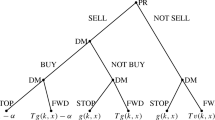Abstract
This paper suggests two approaches to the construction of a two-player game of best choice under incomplete information with the choice priority of one player and the equal weights of both players. We consider a sequence of independent identically distributed random variables (x i , y i ), i = 1..., n, which represent the quality of incoming objects. The first component is announced to the players and the second component is hidden. Each player chooses an object based on the information available. The winner is the player whose object has a greater sum of the quality components than the opponent’s object. We derive the optimal threshold strategies and compare them for both approaches.
Similar content being viewed by others
References
Dynkin, E.B., Optimal Stopping Moment Choice for a Markov Process, Dokl. Akad. Nauk SSSR, 1963, vol. 150, no. 2, pp. 238–240.
Mazalov, V.V., Mathematical Game Theory and Applications, New York: Wiley, 2014.
Mazalov, V.V. and Vinnichenko, S.V., Momenty ostanovki i upravlyaemye sluchainye bluzhdaniya (Stopping Times and Controlled Random Walks), Novosibirsk: Nauka, 1992.
Robbins, H., Siegmund, D., and Chow, Y.S., Great Expectations: The Theory of Optimal Stopping, Boston: Houghton Mifflin, 1971. Translated under the title Teoriya optimal’nykh pravil ostanovki, Moscow: Nauka, 1977.
Alpern, S. and Reyniers, D., Strategic Mating Common Preferences, J. Theor. Biol., 2005, vol. 237, pp. 337–354.
Ano, K., On a Partial Information Multiple Selection Problem, Games Theory Appl., 1998, vol. 4, pp. 1–10.
Enns, E., Selecting the Maximum of a Sequence with Imperfect Information, J. Am. Statist. Ass., 1975, vol. 70, no. 351, pp. 640–643.
Enns, E.S. and Ferenstein, E.Z., The Horse Game, J. Oper. Res. Soc. Japan, 1985, vol. 28, pp. 51–62.
Fushimi, M., The Secretary Problem in a Competitive Situation, J. Oper. Res. Soc. Japan, 1981, vol. 24, pp. 350–358.
Gilbert, J. and Mosteller, F., Recognizing the Maximum of a Sequence, J. Am. Statist. Ass., 1966, vol. 61, pp. 35–73.
Kurano, M., Nakagami, J., and Yasuda, M., Multi-Variate Stopping Problem with a Majority Rule, J. Oper. Res. Soc. Japan, 1980, vol. 23, pp. 205–223.
McNamara, J. and Collins, E., The Job Search Problem as an Employer-Candidate Game, J. Oper. Res. Soc. Japan, 1990, vol. 28, pp. 815–827.
Mazalov, V.V., Game Related to Optimal Stopping of Two Sequences of Independent Random Variables Having Different Distributions, Math. Japonica, 1996, vol. 43, no. 1, pp. 121–128.
Mazalov, V.V. and Falko, A.A., Nash Equilibrium in Two-Sided Mate Choice Problem, Int. Game Theory Rev., 2008, vol. 10, no. 4, pp. 421–435.
Sakaguchi, M., Non-Zero-Sum Games Related to the Secretary Problem, J. Oper. Res. Soc. Japan, 1980, vol. 23, no. 3, pp. 287–293.
Sakaguchi, M., Non-Zero-SumBest-Choice GamesWhere Two Stops Are Required, Sci. Math. Japonicae, 2003, vol. 58, no. 1, pp. 137–176.
Smith, M., A Secretary Problem with Uncertain Employment, J. Appl. Probab., 1975, vol. 12, no. 3, pp. 620–624.
Author information
Authors and Affiliations
Corresponding author
Additional information
Original Russian Text © E.N. Konovalchikova, 2015, published in Upravlenie Bol’shimi Sistemami, 2015, No. 54, pp. 114–133.
Rights and permissions
About this article
Cite this article
Konovalchikova, E.N. A model of best choice under incomplete information. Autom Remote Control 78, 1512–1522 (2017). https://doi.org/10.1134/S0005117917080112
Received:
Published:
Issue Date:
DOI: https://doi.org/10.1134/S0005117917080112




